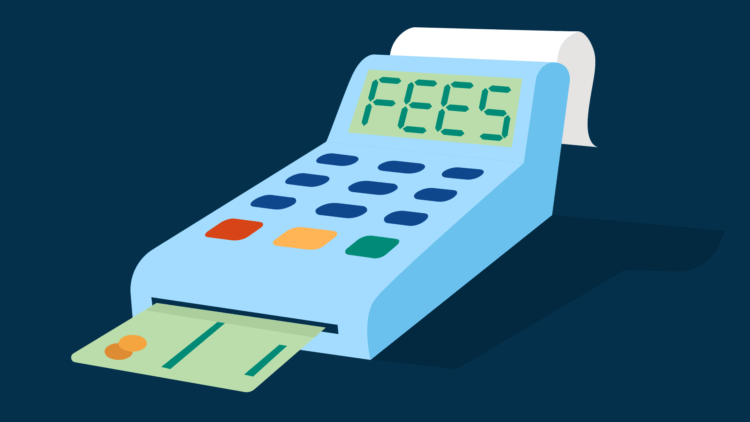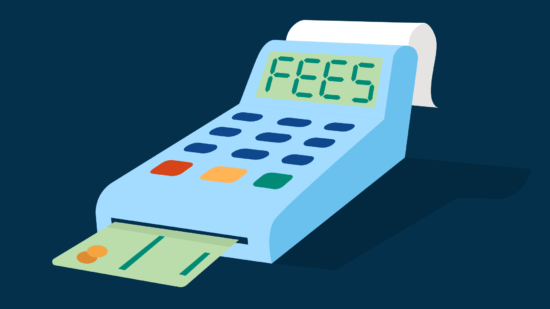According to the 2021 Legal Trends Report, the ability to accept online payments has become a standard feature legal clients are looking for. With the tools that facilitate these payments becoming increasingly ubiquitous across the legal sector, it’s important to understand the important differences between payment processors. Not all third-party processors offer integrations with practice management software. Not to mention the charges incurred for accepting payments can also vary significantly.
In fact, understanding payment processing fees is one of the most challenging aspects when deciding to accept online payments. Fees and variable transaction rates can be confusing and overwhelming. Even for firms that have moved ahead with an online payments solution, their bills from their payment processing provider can come with rows upon rows of minor transaction fees. Those fees are easy enough to ignore in the moment. And then you do the math at the end of the month and realize you’ve spent hard-earned money on unexpected and unnecessary payment processing fees.
Legal payment processing software like Clio Payments makes it easy to pay and get paid by streamlining the payment process, and offers simple, transparent pricing. Your clients can pay electronically using a credit card, debit card, or eCheck, getting you paid faster. Clio Payments also allows for payment schedules and payment reminders and permits you to split bills for multiple payers for one case matter.
What is a legal payment processor?

Legal payment processors allow lawyers to accept credit and debit card payments. When a client presents their card to pay a bill, the payment processing software contacts the card issuer to verify whether the card is valid. If there is enough available credit (or cash in the checking account) to cover the cost of the transaction, then it proceeds and the payee receives a receipt of the payment.
Electronic funds transfers (EFT) or eChecks are similar to a paper check, and work by promising to pay a specified amount from a connected checking account. Unlike a paper check, eChecks are processed electronically through the automated clearing house (ACH) network using a payment processing software solution.
In addition to providing clients credit, debit, and eCheck/ACH online payment options, firms using a legal payment processing solution can offer flexible payment plans, allow for split billing, accept trust payments, and be confident that they’re compliant with trust accounting rules.
Online payment systems also enable passive bill collection. This feature allows legal clients to pay remotely at their convenience, and removes the need for someone at the law firm to be physically present to process the payments.
Picking the right payment processor
Collecting payment for the work you do is integral to the success of your business, so, choosing the right legal payment processor is critical. For lawyers, this means ensuring that you choose a payment processor that is not only safe and secure, but also handles IOLTA (interest on lawyers’ trust accounts) trust compliance.
Maintaining IOLTA trust compliance is imperative since you must keep earned and unearned funds separate in accordance with trust accounting rules. Accordingly, the legal payment processing software you use must accept client trust payments and retainers and keep them separate from your firm’s operating funds. The trust account should therefore be protected from all third-party debiting, including processing fees and chargebacks. This means all trust payments are deposited in their entirety, and transaction fees and chargebacks are never pulled from the trust account.
The cost of your payment processing solution is another important factor to consider. Enabling your clients to pay their bills is the lifeblood of your firm’s success, and the cost of collecting these payments can add up over time. Even small differences in the fees that processors charge can have a major impact on your bottom line.
Fortunately, you have options—options that can reduce risk and make those monthly bills from your payment processing provider more predictable and easier to understand.
There’s all kinds of credit cards and each one seems to have its own payment scheme. With Clio, I know exactly how much it’ll be if a client pays by credit card or check. We love the predictability. – Karen Klukiewicz, COO, Patrick Neale Law firm
You may like these posts
4 steps to avoid paying unnecessary payment processing fees

1. Understand the different types of fees
Multiple fees are often involved in every transaction that is processed. Per-transaction fees for credit cards are typically 1.5-3.5% of the transaction, though some cards may charge higher fees. Fees for eCheck/ACH transactions are typically lower, and may be up to 1.5%. Monthly fees will vary between providers, so ensure you factor this cost in when making your decision.
What is an interchange rate?
An interchange rate is the fee that you—as a merchant—must pay with every credit card (or debit card) transaction. These rates are set by the financial institution or issuer of the card. Fees can vary depending on the type of card, and the type of transaction; standard cards such as a basic Visa card will have a lower interchange fee than a speciality card. Similarly, smaller, everyday transactions like groceries will have lower fees than those associated with high-end purchases like airline travel.
When working with a payment processing provider, these rates are typically charged by the card issuer to the payment provider. The cost is then passed on to the merchant.
Because interchange fees only become fully visible after the transaction—typically when the merchant receives their long, multi-line statement from their payment processor—interchange fees are difficult to predict, and thus can be considered “hidden” fees.
2. Avoid using a processor which charges extra fees
Some processors will charge an additional fee on top of per-transaction and monthly fees.
Note that advertised rates may not tell the full story, either. Some processors may say their rate is 1.95% plus 20 cents, but that may not apply to all cards, just common cards such as your standard Visa card.
Specialty cards – which is most cards these days, including Visa or Mastercard credit cards connected to a rewards program – often come with higher “interchange plus” pricing rates. This can mean an unexpected surprise—in the form of a higher cost— when you receive your bill.
To avoid the cost of a payment processor holding you back, you should compare pricing plans between providers to ensure you’re getting the best return on your investment and avoid being locked into expensive plans. Since multiple fees are often involved, look for legal payment processing tools that offer full transparency into fees, as well as comprehensive reporting, so you can make the best decision for your firm.
As a baseline, expect any credit card transaction fees to be up to 3.75% of the transaction, though some cards will have higher rates. eCheck/ACH fees are typically lower (up to 1.5%).
3. Look for simple, transparent pricing plans
With all the possible variations in fees, it can be helpful to look for legal payment processing providers offering simple, transparent pricing. Clio’s plans are straightforward: the ability to accept payments included in your Clio Manage subscription and you pay one flat, simple rate regardless of the card your clients choose to pay with. If a pricing plan seems convoluted, it is probably best to avoid that provider to ensure you’re not hit with unexpected or hidden fees.
When it comes to payment processing specifically, the most effective way to mitigate risk and ensure you know what rates you’re paying on every transaction.
Clio does not pass through any interchange fees, and you won’t find any unexpected charges on your monthly bill.
And, with Clio Payments, you can use the split billing feature to offer further flexibility to your clients, allowing multiple payers on one bill.
4. Ask questions
The choice of a legal payment processing provider is a major decision, and one that will impact your business well into the future. As you go through the process of selecting a tool, ask lots of questions to make sure you understand exactly what you are—and aren’t—getting.
First and foremost, make sure your provider gives you straight answers on payment processing fees. Ask what their rates are, and ask if they charge different rates for different types of cards, or different types of transactions. Ask about additional fees or charges beyond the ability to accept payments online, ask if PCI compliance and chargeback assistance is included.
Payment processing fees are just part of the equation. Even if you’re satisfied with your provider’s answer on payment processing fees, make sure the solution is right for you. Does the payment processor in question integrate with your legal practice management software? Does it allow for payment plans and offer trust accounting compliance? Do you feel assured this solution is safe and secure for your clients? These are all important questions for legal professionals to ask when choosing a provider.
Getting out of a plan with hidden fees
If your firm is planning to start accepting online payments, or you’re using a legal payment processing solution that’s costing you more than you expected, you can get up-and-running with Clio Payments quickly and easily. You can set up your account and start accepting payments in minutes, ensuring there’s no interruption in your firm’s operations. And if you’re already a Clio customer using another payments provider, you can easily book a consultation with your account manager to discuss switching to Clio Payments.
A Calculator for Lawyers?
On average, Clio customers save eight hours a week. Before you ponder what could be achieved in that extra time, we’ve done the number crunching. Our Return On Investment Calculator measures the revenue your firm can earn when those hours are put to better use.
Calculate your untapped revenue.
We published this blog post in May 2022. Last updated: .
Categorized in: Business
Get paid faster, save time, and reduce outstanding bills
Download our free e-book and learn the 7 easy steps to easier, more efficent billing
Get the e-book







